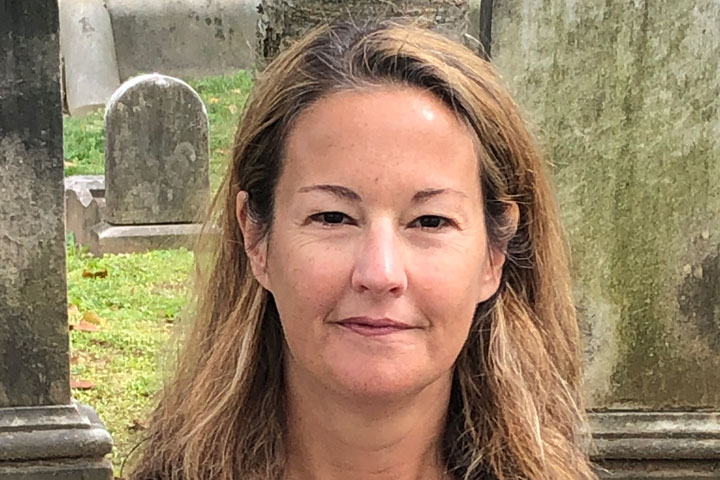Jessica Johnson is an anthropologist who studies and teaches at the intersection of religion and politics, and emphasizes that those domains of inquiry can’t be divested from gender and sexuality.
So the visiting assistant professor of religious studies at William & Mary has covered quite a bit in her two courses this spring: new religious movements in America and a new one — gender, sexuality and religion in America.
That lens also informs her research, which unfolds along the continuum of American culture, politics and religion.
“I don’t approach religion and politics as separate domains,” Johnson said. “As a cultural anthropologist, I’m invested in examining not only what is being said, but how doctrine is communicated. I investigate how conservative Christian churches and white evangelical leaders invite embodied participation from audiences through rhetorical, performative and media-based means, including social media and webcasting.”
Her 2018 book, “Biblical Porn: Affect, Labor, and Pastor Mark Driscoll’s Evangelical Empire,” is about the cultural politics of Mars Hill Church in Seattle under the leadership of Pastor Mark Driscoll. It examines the mega-church’s rise to enormous popularity and eventual fall.
In looking at ways that religion also can exist outside the realm of churches or what would be considered institutionalized spaces of religion, Johnson is currently examining the spread and amplification of online conspiracy theories, as well as their harmful effects.
“My current research investigates how conspiracy theories and forms of disinformation circulating online incite feelings of conviction such that offline forms of violence and acts of domestic terrorism are perpetrated by white men against religious, racialized, gendered and sexualized ‘threats,’” Johnson said. “It’s a different way of thinking about what religious studies looks like or means.”
The COVID-19 pandemic this spring has brought attention to some religious institutions and their practices of gathering in person.
In Johnson’s new religious movements course, she discussed with students how the Shincheonji Church of Jesus in South Korea is considered a cult among more established churches in the area and was blamed for the spread of COVID-19 in its locality, according to reporting by The New York Times.
“In the new religious movements class, we think through the political ramifications of the concept of cult, the concept of brainwashing, as well as how those terms came into being, what they connote derogatorily and how they ‘other’ religious groups,” Johnson said. “We examine how such language hierarchically separates religions that are considered mainstream or traditional from religions that are couched as radical or potentially threatening.”
For example, the class studies the Nation of Islam because it’s a rich example of a new religious movement that has been designated a cult in a way that intersects with other kinds of derogatory associations such as violence, foreignness and criminality, according to Johnson.
“We look at how the Nation of Islam and other new religious movements labeled ‘cults’ are framed that way by the government, the media and religious groups deemed more traditional or mainstream, such as Christians, to examine how that process of classification happens and the politics of that,” Johnson said.
“I’m interested in questions of power, authority and the political and how these dynamics are inflected through religion, and open up the category of religion, in some way, shape or form. The new religious movements course asks students to rethink what religion means and how groups come to be designated as religious, or consider themselves religious. From the feedback that I’ve received, it seems that students get a lot out of our class readings and discussions.”
Her course on gender, sexuality and religion in America started off with theoretical readings in queer theory, followed by readings on American religious history and ethnographic studies that examine how religious, gender and sexual identities intersect and are constituted in relation to other categories of identity such as race, nationality and class.
Students were asked to think about how the politics of gender and sexuality are embedded and enacted in religious practices, worship, doctrine and instruction. They then moved on to ethnographic fieldwork, which usually includes interviews and participant observation, but that final project had to be significantly redesigned in these days of social distancing.
The project was changed so that students had a choice of three options for their final paper — a research paper; a life history with a more personal take on the ethnographic assignment, including the possibility of interviewing a friend or family member; and an online ethnography centered on analyzing the media production of a religious organization.
Current events have continued to be part of class discussions. News articles posted on course discussion boards by students and Johnson include those pertaining to legislation on conversion therapy for minors in Virginia and Liberty University opening up for residential students during the spread of COVID-19.
Johnson is paying attention to which church congregations are choosing to gather in person during statewide shelter-in-place ordinances, and how decisions to gather offline are defended through First Amendment claims to religious freedom by Christian ministers, as well as the U.S. Department of Justice, as part of her current research, she said.























